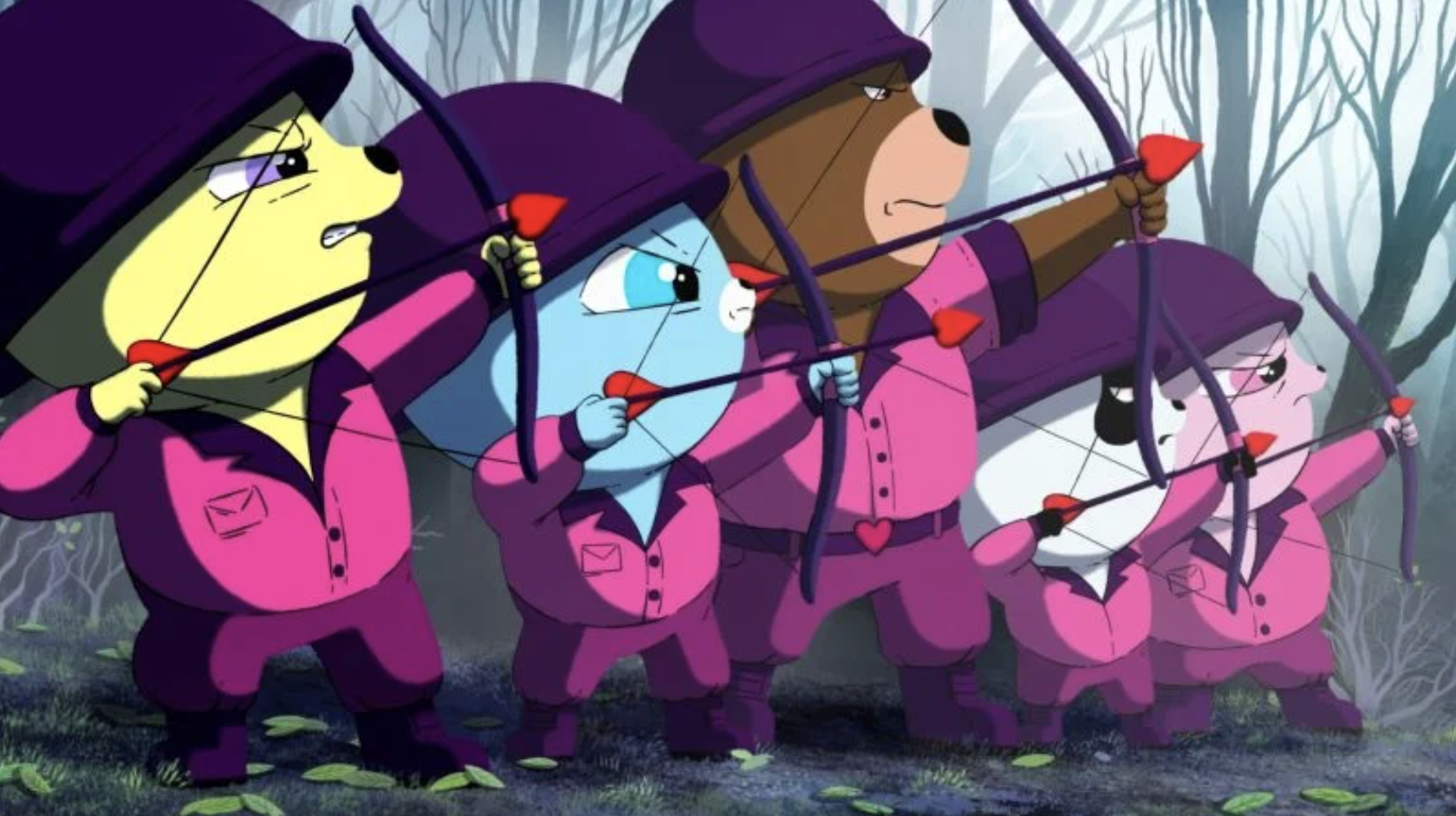UNICORN WARS is a frightening tale for the eyes
Unicorn Wars
Written and directed by Alberto Vázquez
Starring: Jon Goiri, Ramón Barea, Manu Heras
Runtime: 92 minutes.
In theaters March 10
by Daniel Pecoraro, Staff Writer
From the very first minute of Unicorn Wars, the Spanish-French co-production written and directed by Alberto Vázquez (who also provided art direction), I knew that it would haunt my dreams. I was primed for this, of course: I had seen the trailer and had read in a Spanish publication that Vazquez’s inspirations for the film were Apocalypse Now (dir. Francis Ford Coppola, 1979), Bambi (dir. Walt Disney, 1942), and the Bible (dir. ???, three-thousand-ish years ago). However, I wasn’t quite prepared for how every moment and every frame has a high potential for a ghastly result.
The film opens with a unicorn, dark with glowing green eyes (as are all the unicorns in the film) named María. Upon hearing the voice of her lost mother, she chases through an enchanted forest after the sound, arriving at a large cathedral in ruins that is filled with barking, braying apes. At the cathedral’s altar, a sludgy monster from which the voice of María’s mother emanates begins to take form and arise. It then tries to attack and swallow up María, moving like a cross between Hexxus from FernGully (dir. Bill Kroyer, 1992) and the No-Face in Spirited Away (dir. Hayao Miyazaki, 2001).
We’re then taken to Campamento Corazón (Heart Camp), where the motto in training is “Honor, Dolor, Mimos” (Honor, Pain, and Cuddles). Here, fluffy teddy bears are the recruits in the war between bears and unicorns. We see them in basic training, with the requisite drill sergeant (Sargento Caricias/Sergeant Greystroke, a bear with sharp filed teeth). In barracks, a fight emerges over which of the rookies is the cutest, leading to claws coming out and blood being spilled. Our antihero, Azulín (Bluey), receives a cut to his face, young but already weathered due to his parents’ divorce and the death of his mother. After Azulín (who before the fight shames his brother Gordi for his size and sunken eyes) storms out of the barracks, he’s greeted by the Padre at the camp, who hands him a holy book: the story of the war between the unicorns and bears, a crusade for the enchanted forest told from a teddy-supremacist lens.
This all sets us up for a fairly textbook second act, in the mold of Apocalypse Now or Full Metal Jacket (1987, dir. Stanley Kubrick). The recruits continue their drills, Sargento Caricias barking throughout. There’s a mess hall scene with fly-covered porridge where the line “cuddles are made by steel, blood, and pain” is the answer to heated calls for the inedible meal to be replaced by blueberries. The recruits are sent on their first mission, the local townsfolk (including Azulín and Gordi’s father) bidding them farewell, and it’s clear that they’re cannon fodder, collateral damage. The only question is whether this is a war for power, as Caricias and his higher-ups see it, or a war of divine providence as declared by the Padre. Achuchones (Snuggles), a bowtie-wearing bear, is bitten by a lizard in their march through North Vietnam the enchanted forest, leading to a gross, swollen, gangrenous foot that eventually needs amputation. The recruits, in defiance of the Padre and his holy book, eat the flesh of large rainbow-colored psychedelic grubs, which leads to an all-night trip, the Cuddly-Wuddly twins killed in the process—one by the other’s hand, the other hanged. When they finally arrive at the other regiment’s camp in the forest, they arrive upon a field of blood and dead teddy bear bodies disemboweled with flies surrounding them. War is hell, even for teddy bears.
After this point, in the words of Bill Hader’s Stefon, this movie has everything. Grenade suicide bombings by teddy bears. Flashbacks to Azulín and Gordi’s childhood, going all the way back to the amniotic sac. Possible matricide, definite fratricides, and a military coup. An attempt at peace as Gordi, abandoned behind unicorn lines, nurses María back to health, the only purely sweet scene in the film. Multiple teddy bears urinating, with frontal shots of ursine penis. At the center of all of this spectacle is the story of two brothers who were either once close and drifted apart, or one who was insane from the beginning descending even further, his twin left in his bloody wake.
It’s all a little too much darkness, gore, and violence to bear (hehe, get it?), at least for me. Even the Edenic scenes of tiny animals in the forest are animated in Vázquez’s lurid color palette and grotesque, Boschian style, leading me to think that every otherwise innocuous shot of forest rodents had a trick up its sleeve, that something was about to go down. And I need to call out the colorism present in the film: the bears get to be bright and colorful, while the unicorns and apes are (with one exception) nameless, mysterious and black with glowing eyes. I know, they’re enchanted animals, but when the rest of the film is an allegory–for the horrors of war, the banality of evil, and the use of religion to insidious ends–I can connect the dots here. Not to mention the idea of a character known only by his nickname Gordi (Tubby) in 2023.
While at times it can feel a little overdone–maybe one or two flashbacks of Azulín and Gordi’s childhood trauma too many, perhaps a few too many hits over the head with the cartoon violence hammer–Vázquez, animation director Khris Cembe, and composer Joseba Beristain ultimately depict a creepy, hellish world with great skill. It’s one that is at times, sadly, not unlike our own. Except for the talking teddy bears and the unicorns, of course. It all leads to Unicorn Wars being a frightening tale that, despite the clear homages, is unlike any other film I’ve seen before.


